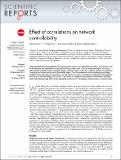Effect of correlations on network controllability
Author(s)
Liu, Yang-Yu; Posfai, Marton; Slotine, Jean-Jacques E.; Barabasi, Albert-Laszlo
DownloadSlotine_Effect of correlations.pdf (1.316Mb)
PUBLISHER_CC
Publisher with Creative Commons License
Creative Commons Attribution
Terms of use
Metadata
Show full item recordAbstract
A dynamical system is controllable if by imposing appropriate external signals on a subset of its nodes, it can be driven from any initial state to any desired state in finite time. Here we study the impact of various network characteristics on the minimal number of driver nodes required to control a network. We find that clustering and modularity have no discernible impact, but the symmetries of the underlying matching problem can produce linear, quadratic or no dependence on degree correlation coefficients, depending on the nature of the underlying correlations. The results are supported by numerical simulations and help narrow the observed gap between the predicted and the observed number of driver nodes in real networks.
Date issued
2013-01Department
Massachusetts Institute of Technology. Department of Brain and Cognitive Sciences; Massachusetts Institute of Technology. Department of Mechanical EngineeringJournal
Scientific Reports
Publisher
Nature Publishing Group
Citation
Posfai, Marton, Yang-Yu Liu, Jean-Jacques Slotine, and Albert-Laszlo Barabasi. “Effect of Correlations on Network Controllability.” Sci. Rep. 3 (January 15, 2013).
Version: Final published version
ISSN
2045-2322